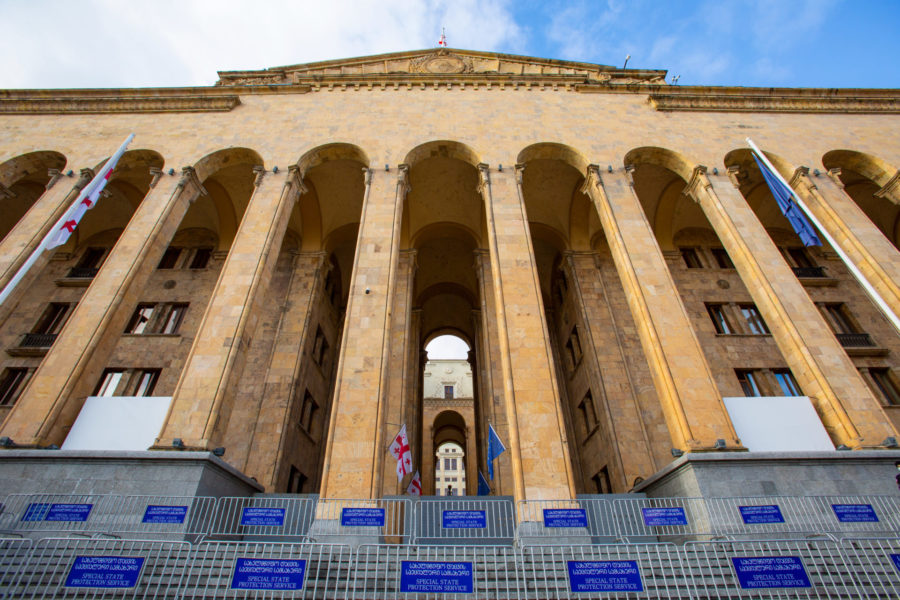Georgian lawmakers must reject the draft “Transparency of foreign influence” bill
We, the undersigned members of the network of Human Rights Houses, express our concern over the Georgian Parliament’s draft “Transparency of Foreign Influence” bill and call on lawmakers to reject it and ensure a safe and enabling environment for human rights defenders and civil society.

In mid-February, the People’s Power party, members of the majority coalition in Parliament, introduced the foreign influence bill (https://jam-news.net/law-on-foreign-agents/). If approved, the bill would require media and civil society organisations that receive more than 20% of its funding from foreign entities to register as “agents of foreign influence” or face fines. The bill defines “foreign entities” as foreign governments, persons who are not citizens of Georgia, legal entities or any kind of organisation not established in Georgia according to Georgian law, or an organisation established according to international law such as a United Nations agency. Under the draft legislation, the Ministry of Justice would be authorised to investigate organisations believed to be so-called “agents of foreign influence”.
This draft bill is another example of legislation designed to both restrict the ability of civil society to raise funds as well as bring into question the role and place of civil society in the public consciousness. It highlights the shrinking space for civil society in Eastern Europe, the Western Balkans, and the Caucasus. It also underscores alarming trends in Georgia attacking fundamental freedoms, including the freedom of association.
States limiting civil society access to foreign resources is not a new phenomenon. In 2012, Russia enacted the first of many “foreign agents” laws designed to eventually crush independent civil society and media. In June 2017, Hungary passed a law forcing any organisation receiving funding from abroad to register as an “organisation receiving foreign funds” and to display this label on all publications or face sanctions. .
Legislative efforts designed to label civil society organisations as foreign agents or agents of foreign influence also seek to limit civil society’s ability to operate freely, and express dissenting or opposing views. Equally importantly, they seek to paint civil society and the media as against the national interests. In short, such legislation deliberately undercuts the very role and nature of independent civil society.
Independent civil society has played a critical role in Georgia’s development. Human rights organisations give voice to marginalised and vulnerable populations, support the Georgian government in upholding its international human rights obligations, and support accountability efforts for violators of human rights. Efforts to restrict human rights organisations funding or call into question their legitimacy should be roundly rejected.
In Georgia, this law, which evokes comparison with similar legislation in Russia, would have a detrimental impact on independent civil society as well as foreign civil society organisations operating in exile in Georgia. Georgia hosts many human rights defenders and activists from across the region and serves as a hub for human rights initiatives and defenders from a number of countries. The proposed bill, limiting freedom of association and expression, would limit their ability to conduct their legitimate human rights work.
Since its introduction in mid-February, the “transparency of foreign influence” bill has been roundly criticised by Georgian and international stakeholders. The administration of the President of Georgia reacted to the draft law and stated that “the President of Georgia cannot support such legislation. . . that brings us closer to the flawed Russian model and not to the European model” (https://civil.ge/archives/526361 ). Georgia’s Public Defender’s Office stated that the bill “does not comply with international or domestic human rights standards” (https://www.ombudsman.ge/eng/akhali-ambebi/sakartvelos-sakhalkho-damtsvelis-aparatis-gantskhadeba-utskhouri-gavlenis-gamchvirvalobis-shesakheb-sakartvelos-kanonproekts-taobaze). Parliamentary Assembly of the Council of Europe (PACE) Rapporteurs on Georgia raised “concerns with regard to its compatibility with democratic and Human Rights standards” (https://civil.ge/archives/525959).
The draft law raises serious questions about its compatibility with the European Convention on Human Rights (ECHR), to which Georgia is a signatory, as well as Georgia’s Constitution. A European Court of Human Rights ruling found a similar law of the Russian Federation to be in violation of the Convention’s Article 11 on Freedom of Assembly & Association (https://hudoc.echr.coe.int/eng?i=002-13687). It also noted that the law had a significant chilling effect on the work of civil society organisations domestically. In addition, Georgia’s constitution obligates the authorities to seek integration with European and Euro-Atlantic structures and institutions. Approving a law which would likely be found in contravention of the ECHR would run the risk of being in contrast to Georgian Constitutional obligations (Article 78, Constitutions of Georgia https://matsne.gov.ge/ka/document/view/30346?publication=36 ).
Georgia has followed a long and sometimes painful path as it has sought to strengthen its democracy and European integration. The draft “foreign influence” bill risks rolling back critical achievements that have been made in recent years, most notably in the enabling environment for civil society and human rights defenders. Georgian authorities must respect the independent and critical role of civil society and reject any efforts to stifle civil society’s voice or role.
The “transparency of foreign influence” bill must be rejected by Georgian lawmakers. At the same time, we call on Georgian authorities to:
-
Ensure safe and enabling environment for civil society;
-
Publicly support and promote the important role of Human Rights Defenders in a democratic society;
-
Provide support to the efforts of free and critical media outlets and promote freedom of expression and independence of media by facilitating an environment that fosters open and inclusive public discourse.
Signed by
- Barys Zvozskau Belarusian Human Rights House
- Belarusian Helsinki Committee
- Civic Initiatives (Serbia)
- Democracy Today (Armenia)
- Election Monitoring and Democracy Studies Center (Azerbaijan)
- Georgian Centre for Psychosocial and Medical Rehabilitation of Torture Victims (GCRT, Georgia)
- Helsinki Committee for Human Rights in Serbia
- Human Rights Centre (Georgia)
- Human Rights Centre ZMINA
- Human Rights House Belgrade
- Human Rights House Crimea
- Human Rights House Foundation (Norway)
- Human Rights House Yerevan
- Human Rights House Zagreb
- Lawyers’ Committee for Human Rights YUCOM (Serbia)
- Legal Education Society (Azerbaijan)
- Media Institute (Georgia)
- Mental Health and Human Rights Info (Norway)
- Pink human rights defender NGO (Armenia)
- Rights Georgia
- Sapari (Georgia)
If you have found a spelling error, please, notify us by selecting that text and pressing Ctrl+Enter.















